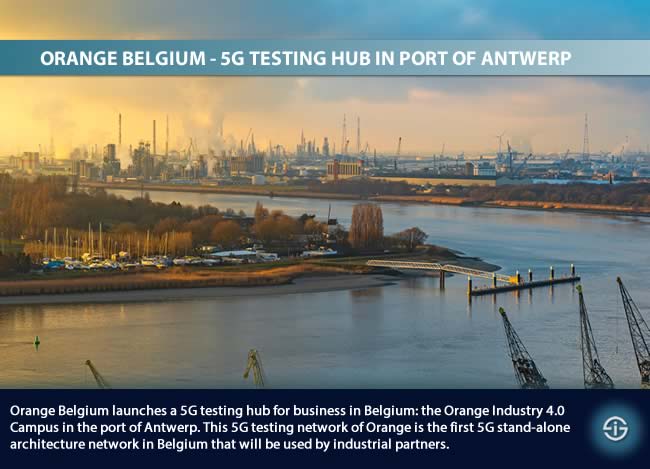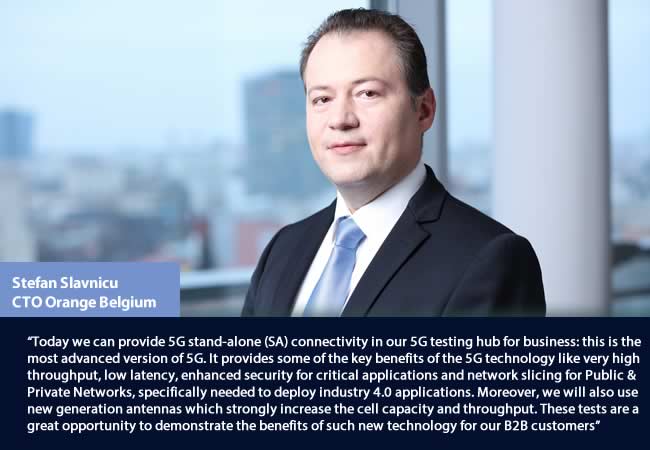Testing 5G for Industry 4.0 use cases and applications. That’s the main reason why Orange Belgium starts an ‘open innovation hub,’ called the Orange Industry 4.0 Campus, the first 5G testing hub for businesses in the country.
There hasn’t been a 5G auction in Belgium yet for political reasons. However, as is the case in most European countries, some companies have shown interest to start with private initiatives or networks.
It’s a bit of a European phenomenon that shows the interest of industrial markets to leverage 5G for smart factories and other industrial applications. In Germany, the Federal Network Agency reserved a bandwidth of 100 MHz from 3.7 GHz to 3.8 GHz for use on local industrial sites.
Orange Belgium selected a Chinese technology partner. But, while Telefónica Deutschland went for Huawei and Nokia for its overall 5G network, the 5G stand-alone (SA) technology of the Orange Industry 4.0 Campus will be realized with Chinese ZTE.
China is ahead of Europe in terms of 5G, as is the US. However, while the US leads on the consumer front in comparison with Europe, the Europeans are moving faster on the business and industrial side of 5G.

Ample large players have taken initiatives, often in the scope of Industry 4.0 ambitions across Europe, and now, with the Orange Industry 4.0 Campus, companies in Belgium can join their ranks.
Testing the capabilities of 5G stand-alone technology in the industrialized environment of the port of Antwerp
The purpose of the Orange Industry 4.0 Campus is to illustrate the possibilities of the 5G stand-alone technology in a highly industrialized environment, Orange Belgium says.
For those who know Belgium, it won’t come as a surprise that this almost by definition means the Port of Antwerp in the Flanders region. On top of the highly industrialized nature of the area, there is also a wealth of use cases and applications waiting to be tested in the environment of the port.
Additionally, the 5G network can only be tested in the Flanders region due to the environmental regulation, even if further improvements are needed as Orange Belgium puts it. To roll out nationally, the regulation should be updated.
Belgian companies have, of course, been complaining about the delays encountered in regards to a national 5G auction, which is largely due to political reasons. They – and industry pundits – fear Belgium could lag as a consequence in the big digital transformation picture.
However, as insiders told us, the mobile network operators probably weren’t too unhappy about the postponing of the 5G auction given the costs of the licenses and tremendous investments to be done before they can even start thinking returns. The Belgian market is and remains small. Going for industrial and business networks first is probably a pragmatic solution on top of a desire of industrial organizations.
The 5G testing network of Orange Belgium is the first network with 5G stand-alone architecture that can be used by industrial partners. So, it’s a separate network, enabling network slicing, very low latency, and massive IoT applications.
The Orange Industry 4.0 Campus: from 7 to 14 sites by April 2020
In a demonstration at the occasion of the announcement of the Orange Industry 4.0 Campus, Orange Belgium demonstrated a data connection with a download speed of up to 1.42 Gbps, an uplink speed up to 329 Mbps, and a latency of 7 milliseconds.
By way of comparison: the latency of LTE-M is around 100 to 150 milliseconds in normal coverage. Orange Belgium also offers NB-IoT and LTE-M coverage.
Orange Belgium points to the benefits of 5G as you know them, mentions some of the application areas (critical IoT, connected vehicles, eHealth and industrial applications), stating that beyond these technological developments, 5G will drive digital transformation across many industries.
The Orange Industry 4.0 Campus is powered by seven sites in the port of Antwerp area where already quite some initiatives with regards to digitalization, the Internet of Things, and the likes exist.
By the end of April 2020, there will be fourteen sites on air, which means coverage in different places in the port of the Antwerp region, good for 150km², and lots of companies and potential tests and use cases.

In commenting on the launch of the Orange Industry 4.0 Campus, the people of Orange Belgium gently remind that to make 5G a success, an evolution of the legal, regulatory, and administrative framework, as well as the spectrum attribution for operators, is still required. That much might be clear by now, but with negotiations on a new government still going on, it was probably a good time to remind it. Belgium doesn’t have a new government at the time of writing this (December 12, 2019, the day the Orange Industry 4.0 Campus was announced), more than six months after the latest elections with probably none to be expected before 2020. Obviously, Orange Belgium says it believes in the potential of 5G for organizations and citizens alike.

